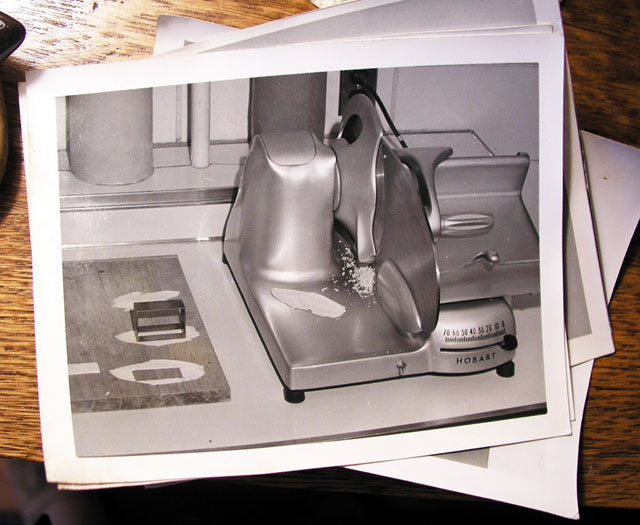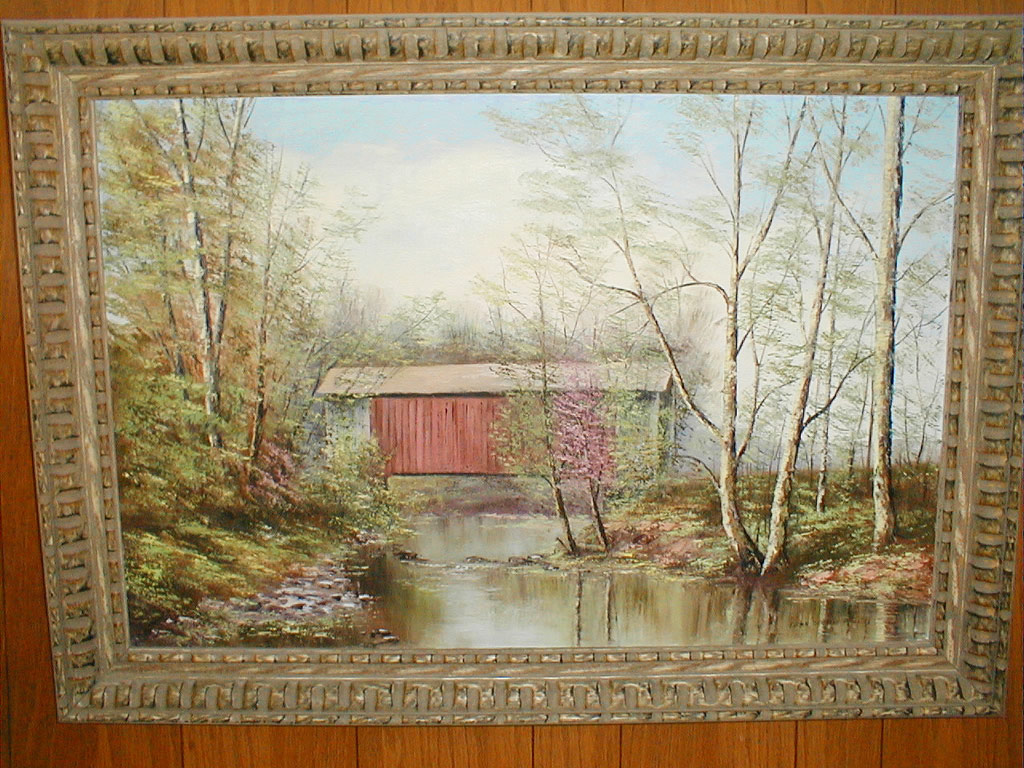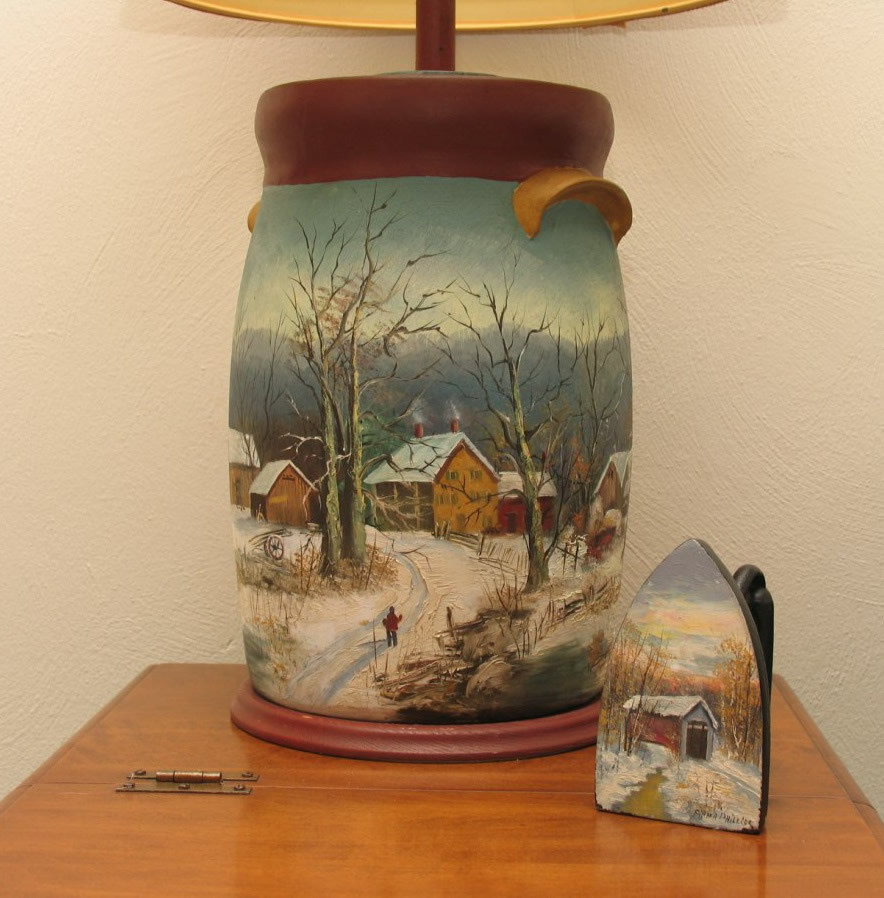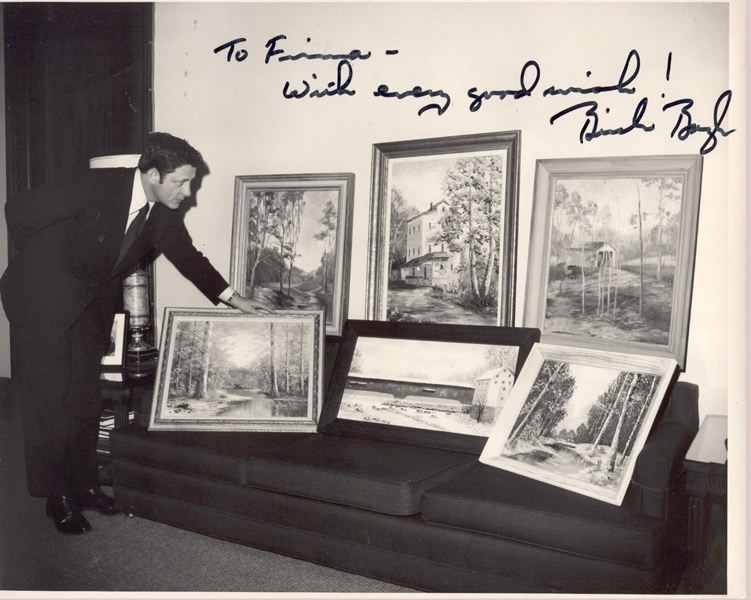I started this blog in 2006 to share my job hunting journey in my fields of technology and education and to share my amateur photography passion. However since then I've strayed into other topics, including (oddly) Marilyn Monroe; a piece of Americana called the Cafe Rienzi; Belgian draft mules; antiques and furniture refinishing; artists Firma Duchene Philips, Tom Durant, and David Grosblatt; and a television series called PREY. And those are just for starters - so browse and enjoy!
Prairie Light eBook Series
| Prairie Light: Seasons of Light | Prairie Light: Prairie Views | |
 |  |
Pages
Friday, December 21, 2007
On Romance with Age
 A sixties child, an idealist, and a survivor / refugee from the 20th Century! (although sometimes I really miss the 20th Century. ;) )
A sixties child, an idealist, and a survivor / refugee from the 20th Century! (although sometimes I really miss the 20th Century. ;) )
Friday, October 12, 2007
Sterile Design Environments vs. Fertile Design Environments
I have worked in computer shops and it departments. Those were my sterile design environments. That's probably a misnomer. They were rich in access to technology, often the newest technology. They were rich in access to creative and capable colleagues in the IT field. But they were sterile in the sense that they were not intimately "wedded to" or "situated in" the areas they served. In a sense their knowledge and skills lived in a vacuum.
Then I have actually worked in jobs where I had to design tools for myself and for a whole group of people to solve a problem we were all grappling with. That kind of job is fertile in that your computer knowledge does not sit in a vacuum with nothing to do and you have inner access to the people and problems that you design solutions for. In fact part of the art of design is engaging users to design solutions along with you.
While the knowledge and skills from the first environment are essential, I think that designing in the second environment produces better products.
It makes sense in the light of modern learning theory which espouses "situated" learning and constructivism.
I have two degrees (well, three actually, but two technology and design related) - an associates degree in computer programming technology and a masters degree in educational technology. I think the two complement each other well. Both teach systems design. However, as I often say, educational technology fills in some gaps in systems design theory, especially when you are designing tools to scaffold people's cognition. And today, with the information boom, and the cognitive overload that inevitably results, those type of tools are more needed than ever. In fact, I think and predict that providing tools that help people effectively manage and use the amount of information that is available to us today and that is required today will be one of the greatest and growing requirements and fields of this new information age - right behind, if not alongside, the computer security field.
Traditionally systems or design theory teaches (sort of) that if you build it they will come. Modern learning theory and constructivism says instead, if they build it, they will use it. This is more than just change management and 'buy-in". Knowledge is socially constructed and negotiated - if something is to be used, it must go through some process of social knowledge construction. If something is designed in isolation, people won't even know it exists and they certainly won't use it. And we've all heard the horror stories about systems "passed down from on high."
Not that these were bad systems. They just neglected to go through an important part of the process.
Tools that scaffold cognition must provide an evironment and the tools for the user to construct and negotiate knowledge. Too often we want to say "out with the old and in with the new," in one fell swoop. This is a mistake.
Windows SharePoint Services provides the environment and tools to help employees manage information overload both in a "top down" and "bottom up" sort of way. Kudos to Microsoft - hey you guys do it right once in a while! ;)
More on this topic later.
JuneBug
 A sixties child, an idealist, and a survivor / refugee from the 20th Century! (although sometimes I really miss the 20th Century. ;) )
A sixties child, an idealist, and a survivor / refugee from the 20th Century! (although sometimes I really miss the 20th Century. ;) )
Monday, September 10, 2007
Summer Hummers
I have enjoyed feeding hummingbirds for many years and was surprised to host so many of the tiny visitors this year. Perhaps it was the drought and the ready availability of a refreshing drink that drew them in. They would drain my feeder dry in a day. At times I would even see four feeding simultaneously – a first that I tried hard to capture on camera but alas it was not to be. Hummingbirds don’t share their space easily, and one extremely territorial little guy soon started successfully taking on all comers.
I named him “Rambo.”
I tried various distractions on Rambo but nothing seemed to work. Finally I hung another feeder at the back of the house, behind the summer kitchen, on the clothesline post, well out of Rambo’s sight - so the other birds would at least have a chance of getting a sip.
About this time we were preparing to go on vacation to a family wedding in Kentucky and then on to Myrtle Beach to visit our daughter. Our friend Mark who rents our summer kitchen had agreed to bring in the mail and the paper and to take care of the dog and cat. Having gone vacationless for two or three years while we changed careers and dwellings, I guess I must have been manifesting some serious separation anxiety because Mark commented to a mutual friend that I would probably leave little reminders and notes for him all over the house. So the night before we left, Mark commented, “Guess what I saw outside my window this morning - a hummingbird feeder! Is that your reminder for me to feed the hummingbirds?”
Actually, I thought it was rather sweet. :)
(And true to character - lol! I had left hummingbird brew in the fridge, intending to tell him to refill the feeders. )
Hummingbird Wars
 A sixties child, an idealist, and a survivor / refugee from the 20th Century! (although sometimes I really miss the 20th Century. ;) )
A sixties child, an idealist, and a survivor / refugee from the 20th Century! (although sometimes I really miss the 20th Century. ;) )
Remember the Mariner
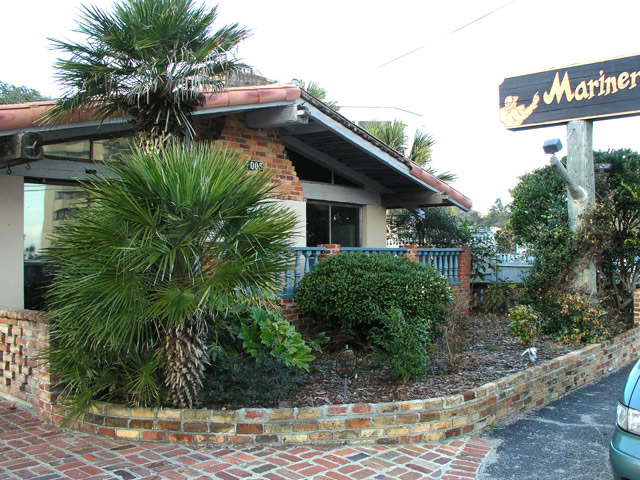
The Mariner is both pet and pocketbook friendly, especially during off season. Built sometime in the 60's, it was laid out in weathered wood, brick, and stone with care and imagination in every step. Buildings, gardens, wading pools, and dog walks wind in maze-like fashion about the grounds presenting the visitor a unique view at every turn. Our suite even had a
 small patio in the back. The motel features several outdoor swimming pools, and even a tennis court. Various authentic nautical devices adorn the grounds and buildings along with wall paintings inside and out that echo both the gardens and the nautical theme. Staff served a complimentary outdoor continental breakfast each morning in the Carolina room. A grill by the pool offered guests opportunity to socialize and cook out on a whim; it was also used for a complimentary weekly Wednesday night dinner, with guests involved in preparations as much as the staff.
small patio in the back. The motel features several outdoor swimming pools, and even a tennis court. Various authentic nautical devices adorn the grounds and buildings along with wall paintings inside and out that echo both the gardens and the nautical theme. Staff served a complimentary outdoor continental breakfast each morning in the Carolina room. A grill by the pool offered guests opportunity to socialize and cook out on a whim; it was also used for a complimentary weekly Wednesday night dinner, with guests involved in preparations as much as the staff.Benny, Hazel, and I met people (and dogs) from as far away as Canada and New England who wintered in the Mariner - all pet owners. Some had been making the annual trek since the 1970's. Many had become friends over the years. They reminisced about floating in the heated pool, a glass of wine in hand, watching the snowflakes drift down. While we were there, the temperature was 80 degrees and gorgeous however. We didn't complain. Nonetheless, when the owner left for the day, someone always managed to sneak into the room where the pool heater resided and crank up the temperature until the pool was almost a sauna, the mist rolling off into the cooler night air. While we enjoyed walks along the beach and wading in the ocean, the air was a bit cold for swimming that time of year. At least we thought so. We had just made our way down through an ice storm that came within 20 miles of Myrtle Beach, after all. But it was wonderful to practically step outside our door and into the heated pool midnight, dawn or anytime inbetween.

In September of 2007 when Benny and I returned to visit Bon, we chose to stay at the Mariner, even though Hazel didn't accompany us on this shorter stay. In contrast to January, September's ocean was warm and relaxing to our travel weary muscles. So was the pool. I found one late afternoon especially gratifying when the three of us swam together in the Atlantic. The swells, slightly over our heads, were gentle and buoyed us up before they broke closer to shore. Unlike my beloved blended family, I had grown up near the Ocean. It felt good watching these two people enjoy something I'd loved since childhood. By this time motel had changed hands. Breakfast was no longer being served, however the room service was excellent. We heard that the Mariner would probably not be maintained and that eventually it would be razed to make room for another high rise luxury condominium. Luxury high rises have their pleasures and conveniences (as we knew from previous visits and also from availing ourselves of the gift shop, delicious restaurants, money machine, and occasional complimentary cup of coffee at the Ocean Reef across the street). But they just don't offer the same experience, I reflected as I sat outside our door one morning, enjoying a cup of java brewed in our room, and feeding leftover crackers from our long drive down to the friendly squirrel and birds at my feet.
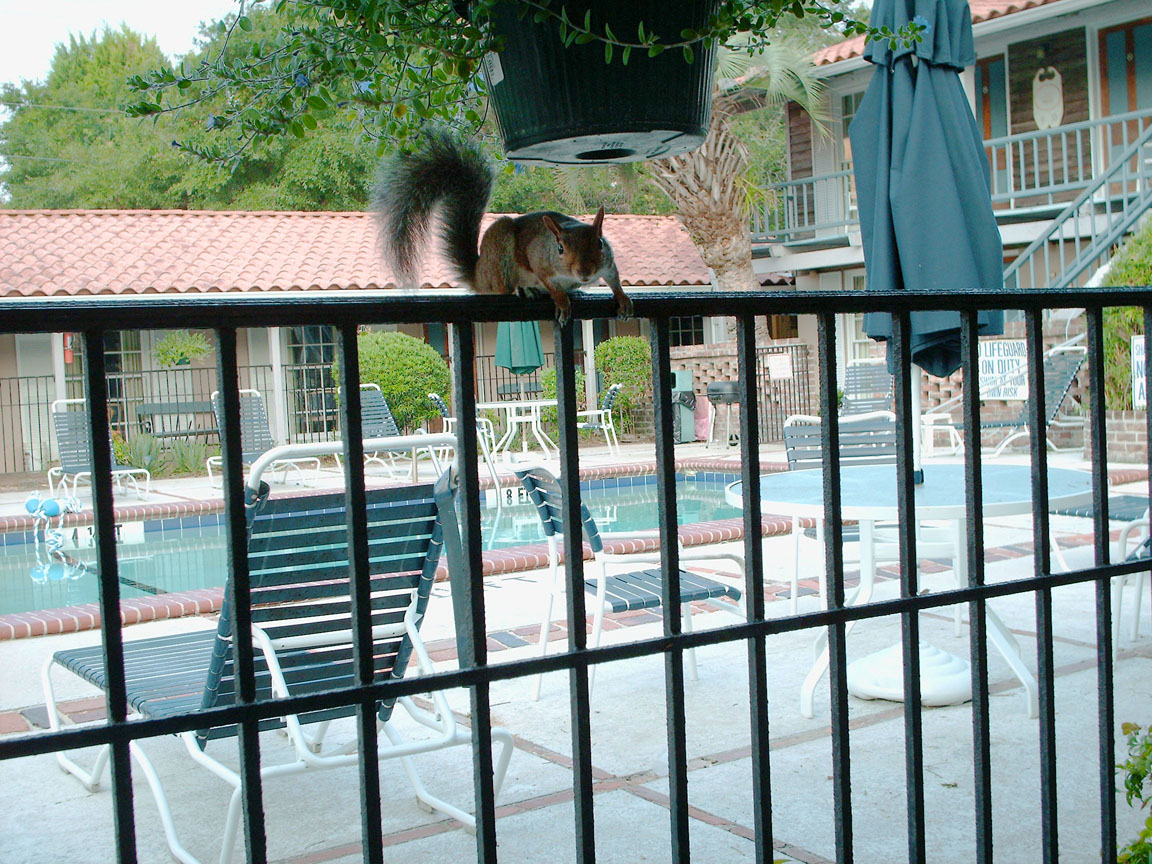
With that thought in mind, I decided to take pictures of everything I could - so that future generations would know that there are choices in how to live, and that things don't have to be just one way.
Remember the Mariner!
 |
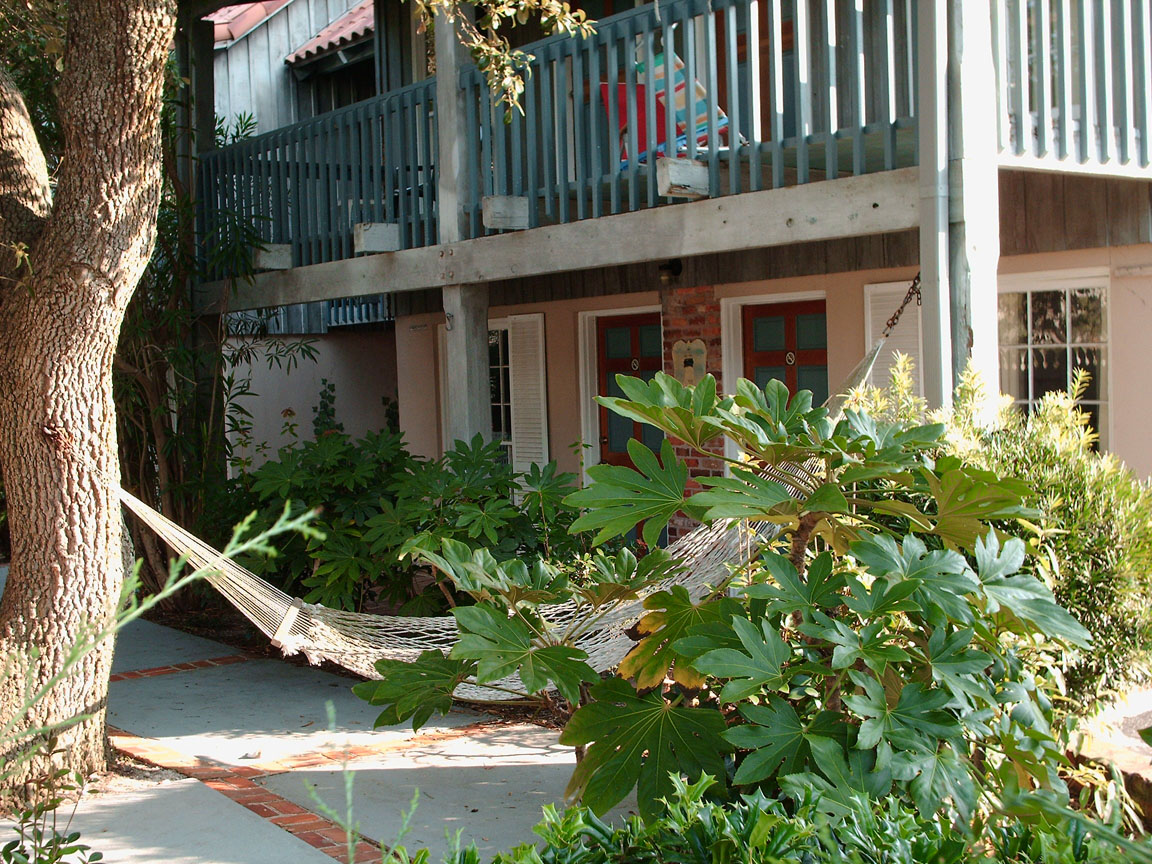 |
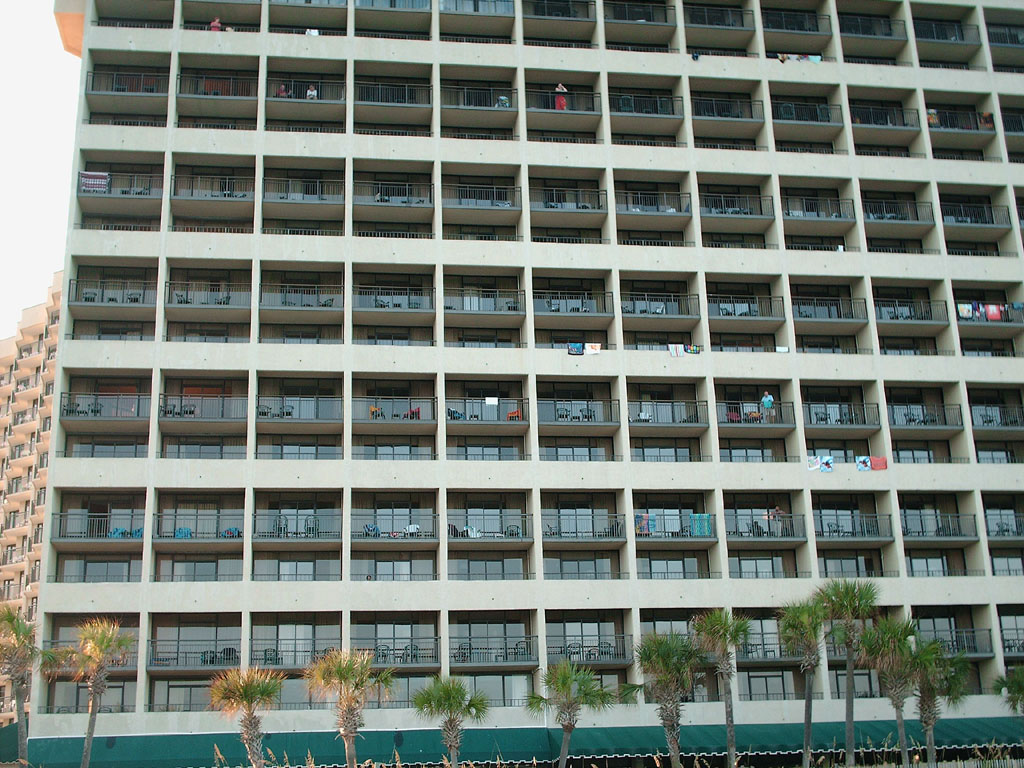 |
 A sixties child, an idealist, and a survivor / refugee from the 20th Century! (although sometimes I really miss the 20th Century. ;) )
A sixties child, an idealist, and a survivor / refugee from the 20th Century! (although sometimes I really miss the 20th Century. ;) )
Sunday, August 12, 2007
Those Brown County Artists on eBAY
The ebay description reads:
Those Brown County Artists
Compiled by Barbara Judd
Edited by M. Joanne Nesbit
Copyright 1993
Published by Nana's Books
234 Pages
Soft Cover
BRAND NEW CONDITION
Just some of the artists written about in Those Brown County Artists:
Adam Emory Albright, Gustave Baumann, Dale Bessire, Curry Bohm, Karl Brandner, Sybil Connell, Anthony Buchta, John Bundy, Ruthven Byrum, Charles Dahlgreen, Homer Davisson, W.A. Eyden, Marie Goth, Alexis Fournier, Robert Root, Ethel Lomasney, Leota Loop, John Hafen, Glen Cooper Henshaw, Karl Martz, Paul Randall, Frederick Polley, William McKendree Snyder, Roy Trobaugh, Gaar Williams, Arnold Turtle, George Jo Mess, Frank Hohenberger, Lucie Hartrath, Carl Krafft, Kenneth Reeve, Doel Reed, Clifton Wheeler, Oscar Erickson, L.O. Griffith, Carl Graf, Georges LaChance, Paul Turner Sargent, Ada Shulz, Derk Smit, T.C. Steele, Will Vawter, E.K. Williams and many others.
The url is listed below:
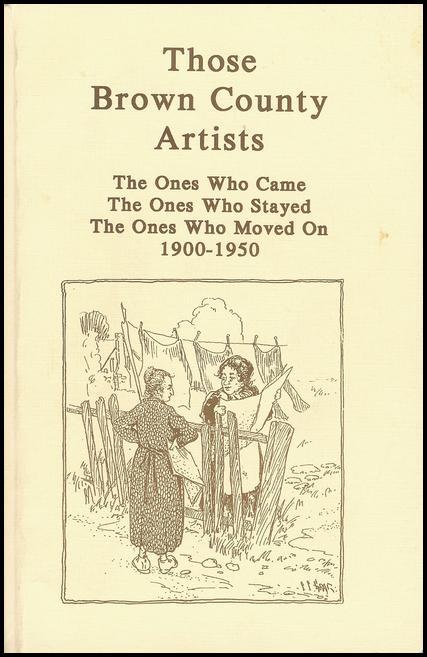
Ebay Auction - Those Brown County Artists
While Aunt Firma is not mentioned in here (Technically, She's a Fountain County or Parke County Artist), she often traveled to Brown County to paint.
 A sixties child, an idealist, and a survivor / refugee from the 20th Century! (although sometimes I really miss the 20th Century. ;) )
A sixties child, an idealist, and a survivor / refugee from the 20th Century! (although sometimes I really miss the 20th Century. ;) )
STOP THE PRESSES!
Wow! Stop the Presses, all you inquirers who want to know the worth of your painting by Firma Phillips! Wait'll You Read This!
At our first formal barn / garage / antique sale at our new location, lots of friends and neighbors stopped by. One friend from church Cathy Franz has been a patron of Aunt Firma's paintings for many years. She went to an estate sale recently where one of Aunt Firma's paintings sold for $1200!!!!!!
She was also telling me that there was a gentleman in ... Kokomo or was it Frankfurt ... who collects Aunt Firma's paintings. She is going to call to give me the contact information.
Sorry the information is so sketchy, the barn sale was hugely busy, and I didn't have time to write down all the details, but will fill them in as I get a chance.
JuneBug
 A sixties child, an idealist, and a survivor / refugee from the 20th Century! (although sometimes I really miss the 20th Century. ;) )
A sixties child, an idealist, and a survivor / refugee from the 20th Century! (although sometimes I really miss the 20th Century. ;) )
How Dr. Wise Tested Rigor
He would place these samples into a small test chamber which also had several blades as shown below:
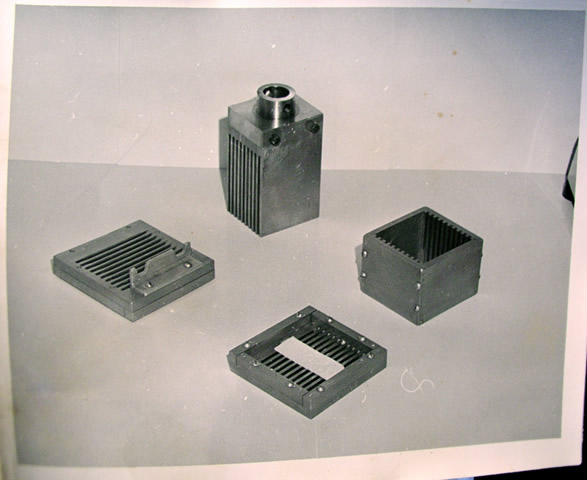
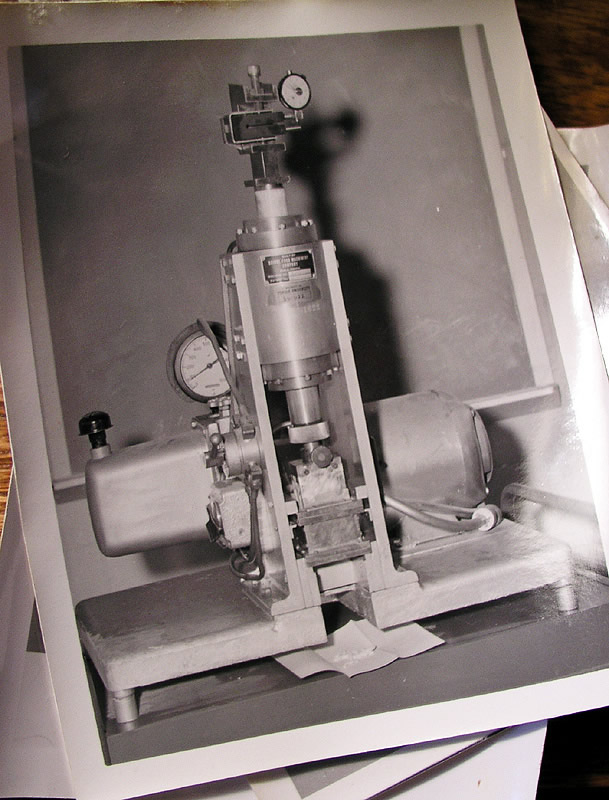
Dr. Wise's thoughts about the death of Marilyn Monroe
 A sixties child, an idealist, and a survivor / refugee from the 20th Century! (although sometimes I really miss the 20th Century. ;) )
A sixties child, an idealist, and a survivor / refugee from the 20th Century! (although sometimes I really miss the 20th Century. ;) )
Dr. Wise's Article on the Death of Marilyn Monroe
One of the drugs that Dr. Wise studied in his search for a speedier way to resolve rigor in chickens was Nembutal. He discovered, however, that instead of speeding up resolution of rigor mortis, Nembutal prolonged it.
Interestingly, Nembutal at low levels is also used as a sedative for humans and was a medication that Marilyn Monroe reportedly took as a sleeping aid and the one that she reportedly died from. But was her death really suicide? Or was it something else?
Since earning his PhD., Dr. Raymond Wise has been a researcher, a farmer, and a business man for the past 50 years. He actually developed the powdered egg formula that NASA’s astronauts ate on their trip to the moon. Over the years he has consulted with major corporations in the food industry on a variety of problems, ranging from the crispness of 40% bran flakes and soda crackers to the tenderness of pork and beans. His list of clients included Kellogg, Swift, Eli Lilly, and many others. Now retired he writes about something that has been on his mind for many years, some information from his thesis that might help to more accurately pinpoint the time of death of Marilyn Monroe.

1960
Rigor Mortis occurs when striated muscle fibers are shortened by expenditure of energy in the form of ATP. Huxley (1958) reports shortening of the fibers, increasing in density. Wise (1960) found that Nembutal (Pentobarbital Sodium) lengthens the duration of rigor of muscles by 40% as evidenced by shear resistance of muscle when shear-tested. Resolution occurs when all the ATP are used up and tense muscle fibers relax.
Nembutal lengthens the resolution phase. The Wise study (1960) concluded that the Nembutal prolongs rigor duration and resolution several hours when compared to no use of Nembutal in control animals. While the Wise study used chicken muscle, and the Huxley study used rabbit muscle, these would be similar, and also have application to humans.
Death comes when all the energy in dying tissue is exhausted. It occurs in the liver last, which accounts for the temperature of the liver in a pan during the autopsy of Marilyn Monroe being relatively high in a cool morgue on Sunday. The last part of the body to die when all ATP are used is the liver.
The bruises on Marilyn Monroe’s posterior indicate that she was probably alive when the ambulance driver James Hall accidentally dropped her while he was loading her into the ambulance at approximately 3:30 a.m.
Corpses do not bruise.
I believe my research on Rigor supports the evidence that Marilyn Monroe died later than was originally claimed by Dr. Engelberg when he initially pronounced her dead to Officer Clemmons shortly after 12:30a (p. 123, Marilyn Files). I believe that she died at 3:30 am or later. I believe Mrilyn Monroe was murdered for whatever reasons.
There was obviously a cover up that included many people. I won’t name all of the people involved, but two significant ones are:
- The housekeeper, Mrs. Murray, who recanted her story in 1985 and
said RFK was at Marilyn Monroe’s the evening before she died and that
she had lied to provide an alibi for him and - JFK, the President of the United States.
American, (November Issue).
Merck Index, 7th Edition.
Nuland, Sherwin B. (1995). How We Die. Vintage Press.
Slatzer, Robert (1992). Marilyn Files. SPI Books.
Wise, Raymond G., Ph.D. (1960). Some Factors Affecting Poultry
Meat (including a chapter on the effects of Nembutal on the duration
and resolution of rigor mortis). Thesis at Purdue University.

 A sixties child, an idealist, and a survivor / refugee from the 20th Century! (although sometimes I really miss the 20th Century. ;) )
A sixties child, an idealist, and a survivor / refugee from the 20th Century! (although sometimes I really miss the 20th Century. ;) )
Thursday, July 26, 2007
Introducing Ray and Peggy Wise
Although we had occasional interaction with Ray and Peggie at their store and in conjunction with Benny's refinishing, we actually got to know them better in later years. Benny especially struck up a close friendship with Ray and Peggie when he took them to the 2001 Farm Progress Show just down our road from our houses after Ray was recovering from open heart surgery and was unable get about without assistance. Benny and another friend of ours, Larry Giroux, also mowed the Wise's yard after Ray had that surgery, as good neighbors often do.
Ray and Peggie were friendly, kind, intelligent, and interesting people. They were members of the First Christian Church in Lafayette for most of their married lives. Although a disciplined, empirical scientist, Ray has lived comfortably with both his science and his faith. He is even somewhat of a mystic. Ray has given Benny and me some really fun and nice things to sell at antique shows and in our booth at Antique malls. Many items were primitives. One in particular was a bob sled he had made as a boy with a steering wheel from an old Model T Ford. More recently he contributed an old unicycle to our garage sale.
Peggie Wise passed away in late winter / early spring of 2006 after a long bout with Alzheimers and diabetes. When she had to move to a nursing home because of her medical condition, Ray faithfully went to sit with her every day. Married almost 60 years, he has been lost without her.
One of the things that Ray has always wanted to finish was an article on the fate of Marilyn Monroe. He had always felt that the research he'd done for his Ph.D. could shed some light on her death and he followed the news of the time and subsequent books about it with great interest.
He has been kind enough to allow me to post his observations on this blog, so stay tuned ... :)
 A sixties child, an idealist, and a survivor / refugee from the 20th Century! (although sometimes I really miss the 20th Century. ;) )
A sixties child, an idealist, and a survivor / refugee from the 20th Century! (although sometimes I really miss the 20th Century. ;) )
Saturday, July 21, 2007
From another of Aunt Firma's Patrons
short covered bridge that he and his family purchased at a church garage
sale several years ago. He says that it hangs in their family room and
that they enjoy it very much.
Thanks, Robert, for this lovely sample of Aunt Firma's work!
Sincerely,
JuneBug
 A sixties child, an idealist, and a survivor / refugee from the 20th Century! (although sometimes I really miss the 20th Century. ;) )
A sixties child, an idealist, and a survivor / refugee from the 20th Century! (although sometimes I really miss the 20th Century. ;) )
How much is your painting worth?
Hello Jeanne:
I would like to have an idea of the value of a fall scene that I purchased from Firma in the summer of 1973. The oil painting is about 30 inches wide and 24 inches high. I don't intend to sell it. Rather, I intend to contribute it to my law firm.
Allow me to share an anecdote. When I purchased the painting, I gave Ms. Phillips a check drawn on a Boston bank. She accepted it. I couldn't help asking her, "How do you know that I am who I say I am and that my check is good?" I never forgot her response. "You didn't come all the way to Turkey Run, Indiana to pass off a bad check. Anyway, I can always paint another painting!" I have told the story many times. The check, incidentally, was good.
Best wishes.
Morris Robinson
I asked the family and got the following answer from cousin Dorinda that many might find helpful:
There are several questions that I need to ask ...
1. I would imagine that is in excellent condition, if not, then that would devalue the painting.
2. What type of frame is it in?? If the painting is in an ornate frame then the package is worth more than if it is in a plainer frame.
3. I have found that some subjects she painted are worth more than other subjects ( less known subjects i.e. a painting of Turkey Run Bridge is more memorable to collectors than an obscure barn).
4. Just going by size and subject matter, One sold last year on Ebay for $175.00 and another was over $200.00 approximately the same size.
Hopefully, this information helps you.
Dorinda
Also thanks to Dorinda for the following suggestion:If you set up an automatic search on ebay for Indiana Artists, pay particular attention to paintings that may show up from Brown County artists from the 1940's, 50's, 60's, and 70's, to see what they look like and how they are priced. Aunt Firma used to go to Brown County to paint, and she may well have painted with, or at least met some of these people. The styles seem very similar.
Other relevant localities include Parke County and Fountain County - I believe Aunt Firma helped influence many of those artists. For instance the two Parke County artists listed below mention on the Parke County Covered Bridge Art Association web site that they studied under Aunt Firma - and I'm sure many others have also studied with her through the years.
Mary Harrison
Louise Michael
 A sixties child, an idealist, and a survivor / refugee from the 20th Century! (although sometimes I really miss the 20th Century. ;) )
A sixties child, an idealist, and a survivor / refugee from the 20th Century! (although sometimes I really miss the 20th Century. ;) )
From one of Aunt Firma's Patrons
Jeanne:
I found you through a search for Firma Phillips on the web. Love your website, as I come from a family of maniacal amateur photographers, and, alas, have the bug myself.
Our mother passed away last Wednesday at age 88. We are sad, but she was ready to go, and said so outloud to several of us in the last few months. While her health was not the best, she was reasonably O.K. and active to the end. She took a fall on Wednesday morning, the first sign of anything wrong, and was gone by 2 the same afternoon. This was how she wanted to go.
We're now in the throes of deciding what to do with her things. Amongst the treasures are 2 works by your aunt that my brother bought for our parents. We will probably keep them in the family, but want to establish value for insurance purposes. We wonder if you might know who to contact who might know the value of her work these days. One work is painted on an old cast-iron flat iron, a winter scene of a covered bridge. It is signed, but not dated. The second is a large crockery butter churn, with winter scenes of houses and barns painted over the entire surface. The pottery lid is also fully painted. It is signed and dated 1972. My father drilled a small hole in the bottom and converted it to a table lamp, but we have the original wooden churn plunger if someone preferred to have it look like a churn again.
I do not have digital photos at the moment, but will send some if it would help evaluate the works, or if you would just like to see them. Thank you in advance for any information you can provide.
I'll be sending a link to your "Weddings and Funerals" story to my sibs - I think it would be a good read for them right now. It was for me.
-- Bill Morgan
Morgan Roemmel Design, LLC
Muncie, Indiana
 A sixties child, an idealist, and a survivor / refugee from the 20th Century! (although sometimes I really miss the 20th Century. ;) )
A sixties child, an idealist, and a survivor / refugee from the 20th Century! (although sometimes I really miss the 20th Century. ;) )
Cousin Lowell on the topic of Firma
She studied painting at Wabash College after she had been painting for a while. She had a studio at Sugar Creek village by Turkey Run and previous to that one at Grange Corner just south of the old Grange Corner store and of course in both of her residences.
My sister Marie stayed with Glen and Firma while she studied nursing during much of World War 2. That was in Paris,Illinois. Marie would have not been able to afford nursing training without the generosity of Firma and was always grateful to Firma.
I would imagine that most of the artist that were of her era have passed on now ... contact the Covered Bridge Association for more information.
Sad that I know so little about a person I liked and admired.
Lowell
Addendum: When I said that Firma studied Painting at Wabash College ,I should have said she was tutored by an art professor from Wabash College. I think this was when she learned to paint with a knife. Barbara said that Firma had painted a picture of the instructor.
 A sixties child, an idealist, and a survivor / refugee from the 20th Century! (although sometimes I really miss the 20th Century. ;) )
A sixties child, an idealist, and a survivor / refugee from the 20th Century! (although sometimes I really miss the 20th Century. ;) )
More History on Firma
My wife, Marie L. Alward, her niece, was the sole heir to her estate when she died. Marie lived with "Aunt Firma" in Paris, Ill for a year before going to nursing school there and saw her frequently during that 3 year period.
Firma was the first in her family to graduate from high school which was in Kingman. Indiana. She was one of five girls and three boys. Her father was born in France and came to the US when he was ten. As an adult he was a coal miner and moved about Indiana where there were mines. Most of Firma's growing up years were in Fountain and Parke County. Living in small rural areas they experienced a great deal of prejudice, even to having a cross burned in their yard (KKK) because the community considered them foreigners and catholic . It was necessary for Firma to work to earn money to go to HS.
 A sixties child, an idealist, and a survivor / refugee from the 20th Century! (although sometimes I really miss the 20th Century. ;) )
A sixties child, an idealist, and a survivor / refugee from the 20th Century! (although sometimes I really miss the 20th Century. ;) )
Artist Firma Duchene Phillips
come across my story about my Great Aunt Firma Duchene Phillips
and have contacted us to let us know you have one of her paintings or to
share a memory of her or were just wondering about the current value of
some of her works. We have really enjoyed hearing from all of you and
seeing all the lovely pictures you have sent.
I am posting on this topic on my blog site for those who are
interested in Aunt Firma and her art work so that people can not only
share with us but with one another. I'll be happy to put any pictures
that you want to share of her works on the web so that you can link to
them - just email me.
I do watch for her paintings on ebay and will try to post a notice
here when someone puts up one of her paintings for auction. It has
happened a few times. It's funny - even though Benny and I have dabbled
in the antique and refinishing business for several years, I haven't
come across any of her paintings myself in antique stores or malls or
flea markets - hopefully that means people must be hanging on to them.
Thanks again and hope to hear from you!
JuneBug, Co-Proprietor of Second Looks Antiques and Refinishing
 A sixties child, an idealist, and a survivor / refugee from the 20th Century! (although sometimes I really miss the 20th Century. ;) )
A sixties child, an idealist, and a survivor / refugee from the 20th Century! (although sometimes I really miss the 20th Century. ;) )
An amazing story ...
from a guy in Seattle, Washington, named Roger Ligrano. Said he had come by 19
or 20 paintings by a David Grossblatt. And that he had looked him up on the internet
and found my website on the Café Rienzi, and could I please call him back, as
they were very eager to find out the background of these paintings. When I called,
Roger Ligrano, as it turns out, is also an artist. He has exhibited with Dale
Chihuly at the New York Botanical Gardens in 2006. Anyway, here’s how the story
unfolds … A friend of Roger’s somehow managed to intercept three truckloads worth
of paintings on their way to the dump. He salvaged 19 or 20 of them and took them
to Roger. Roger started hunting down the artist. “Do you know,” he told me, “there
is almost nothing about David Grossblatt on the web? But whatever there is seems
to be closely related to this Café Rienzi.” He had come across my Rienzi page
and from there discovered my business page and phone number and decided he would
attempt to contact me after a number of other leads failed. He was very interested
in finding out about the artist, and whomever was getting rid of these paintings,
and about the Café Rienzi. So I called my Aunt Joan and Uncle Tom and am in the
process of hopefully hooking them up with Roger so he can interview them, so to
speak. In the meantime, Roger emailed several photographs of David’s paintings,
and without further ado, here they are:
Featuring the Discovered Works of Artist David Grossblatt, Co-owner of the Cafe Rienzi
courtesy of Ligrano Studios, Seattle, Washington
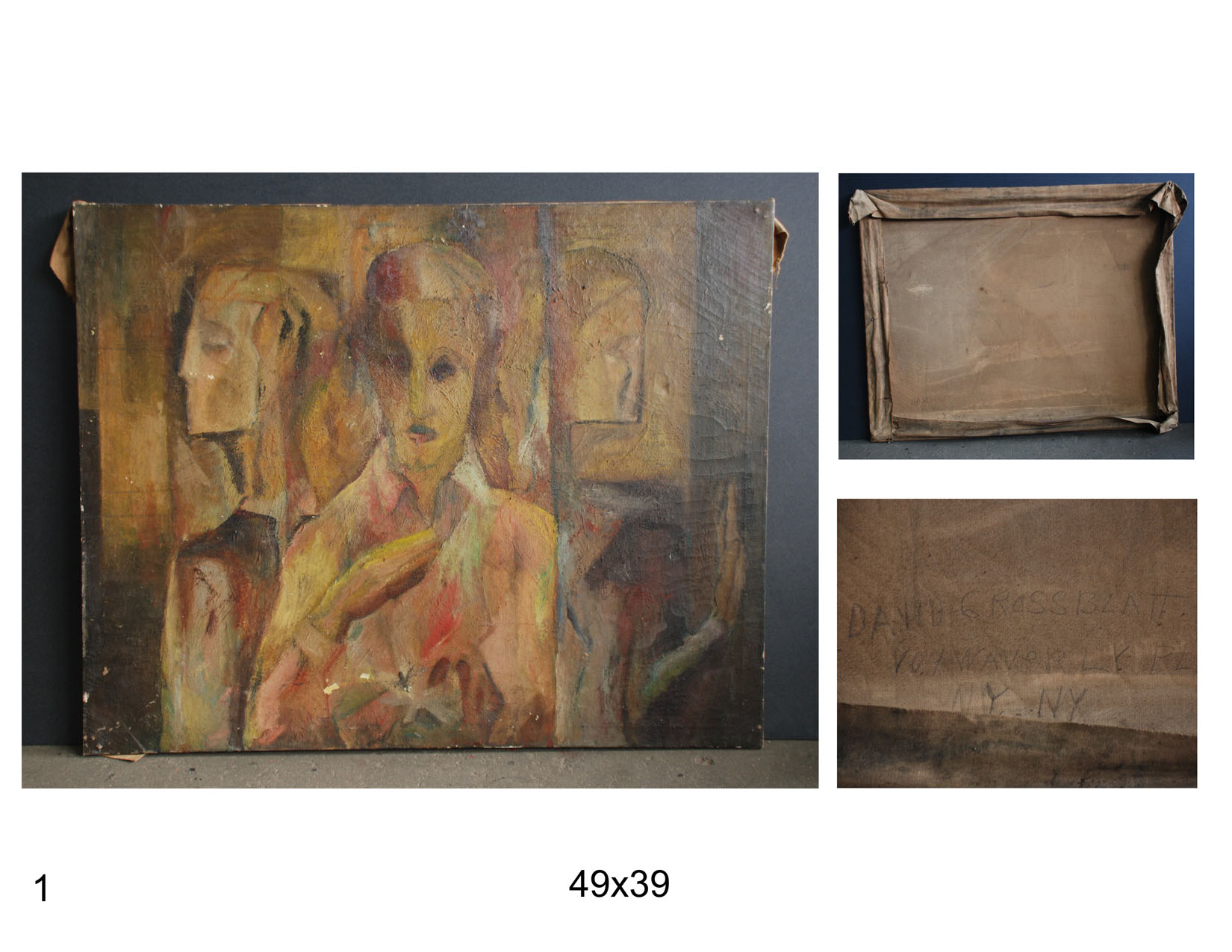
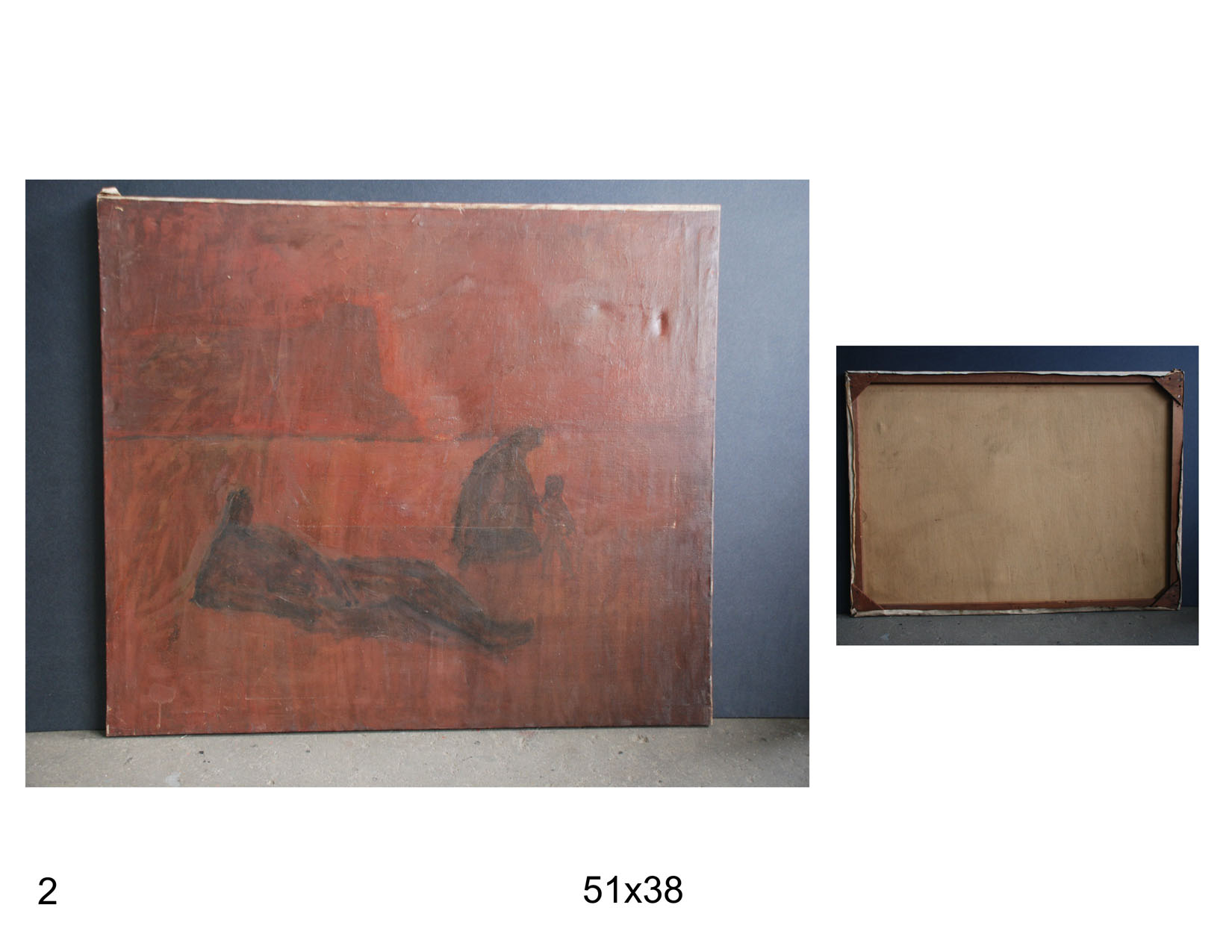
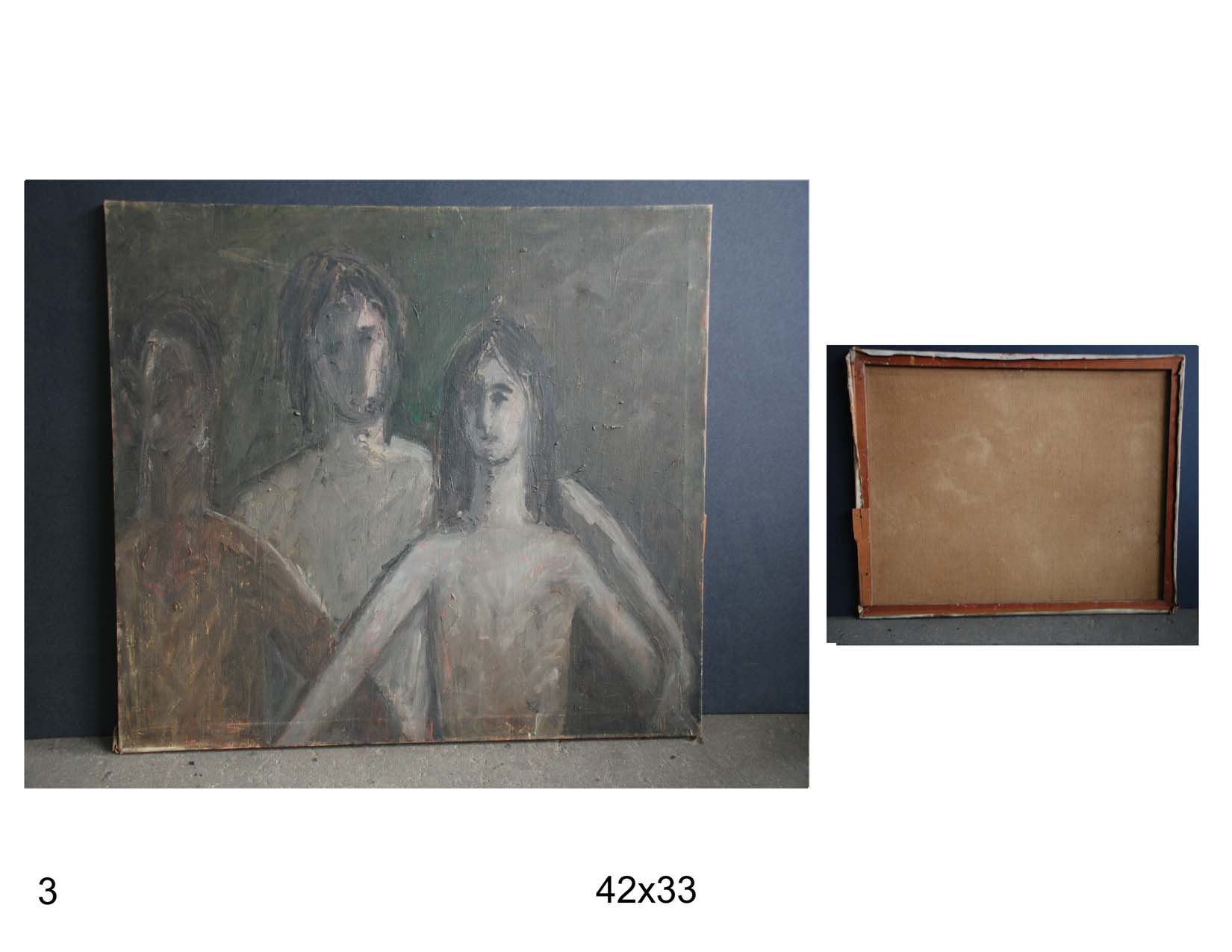
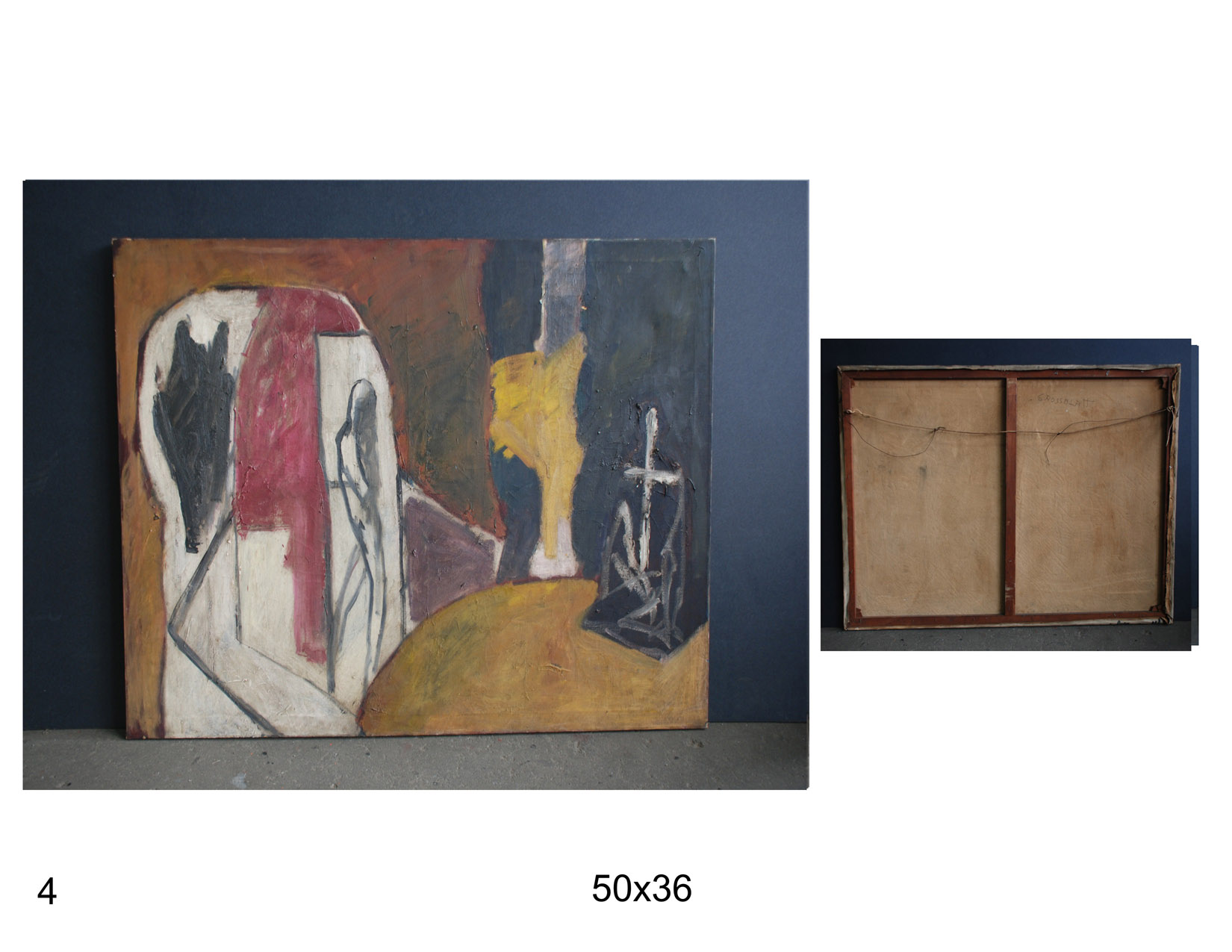
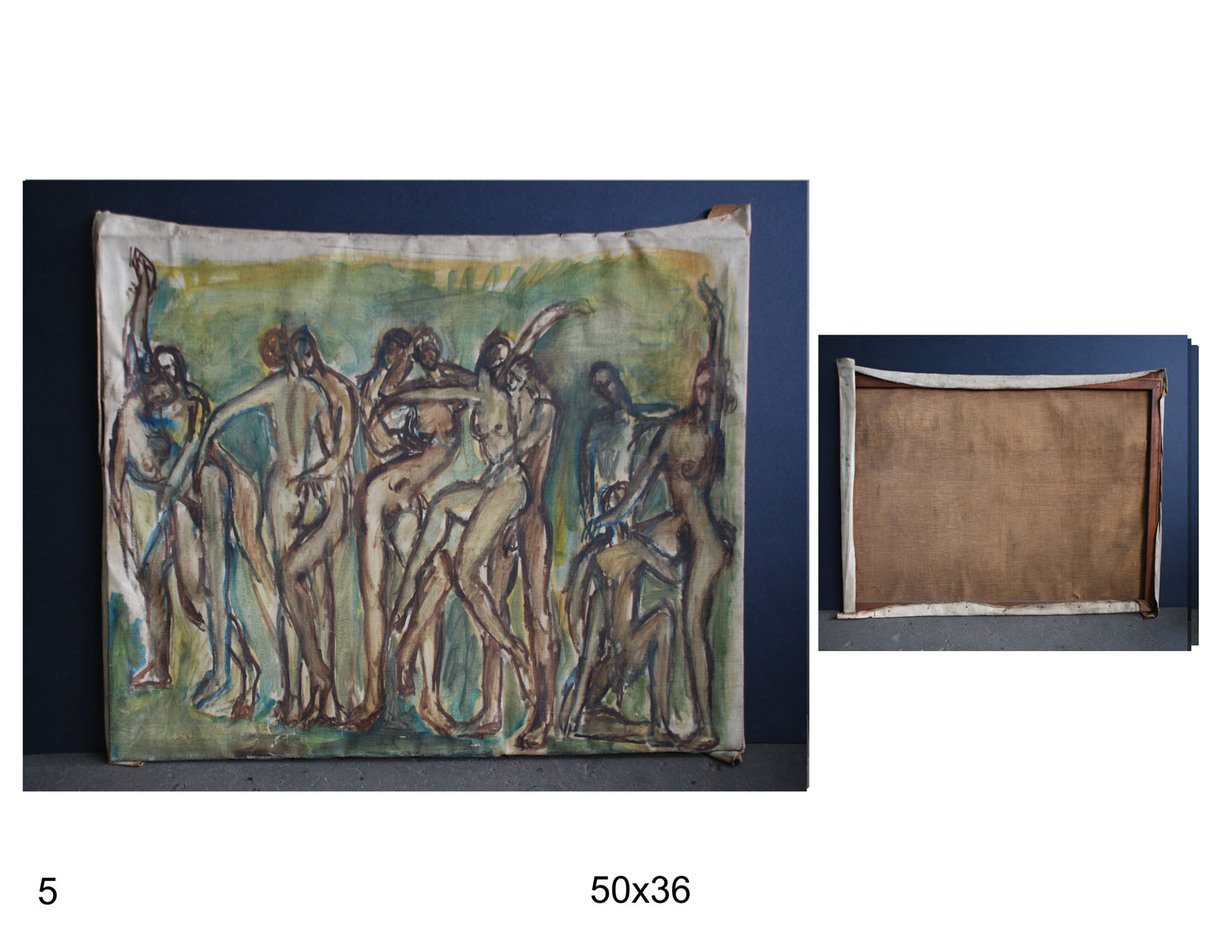
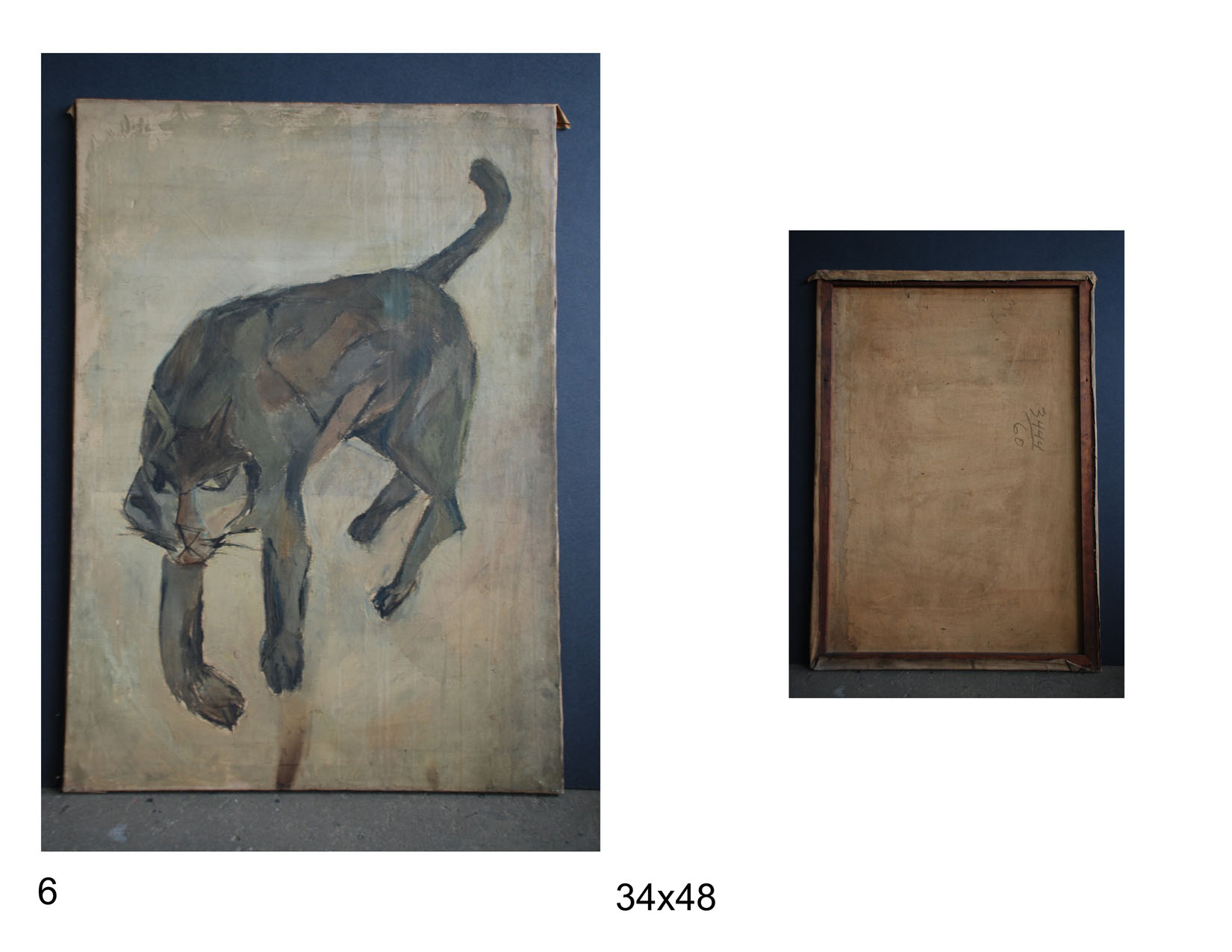
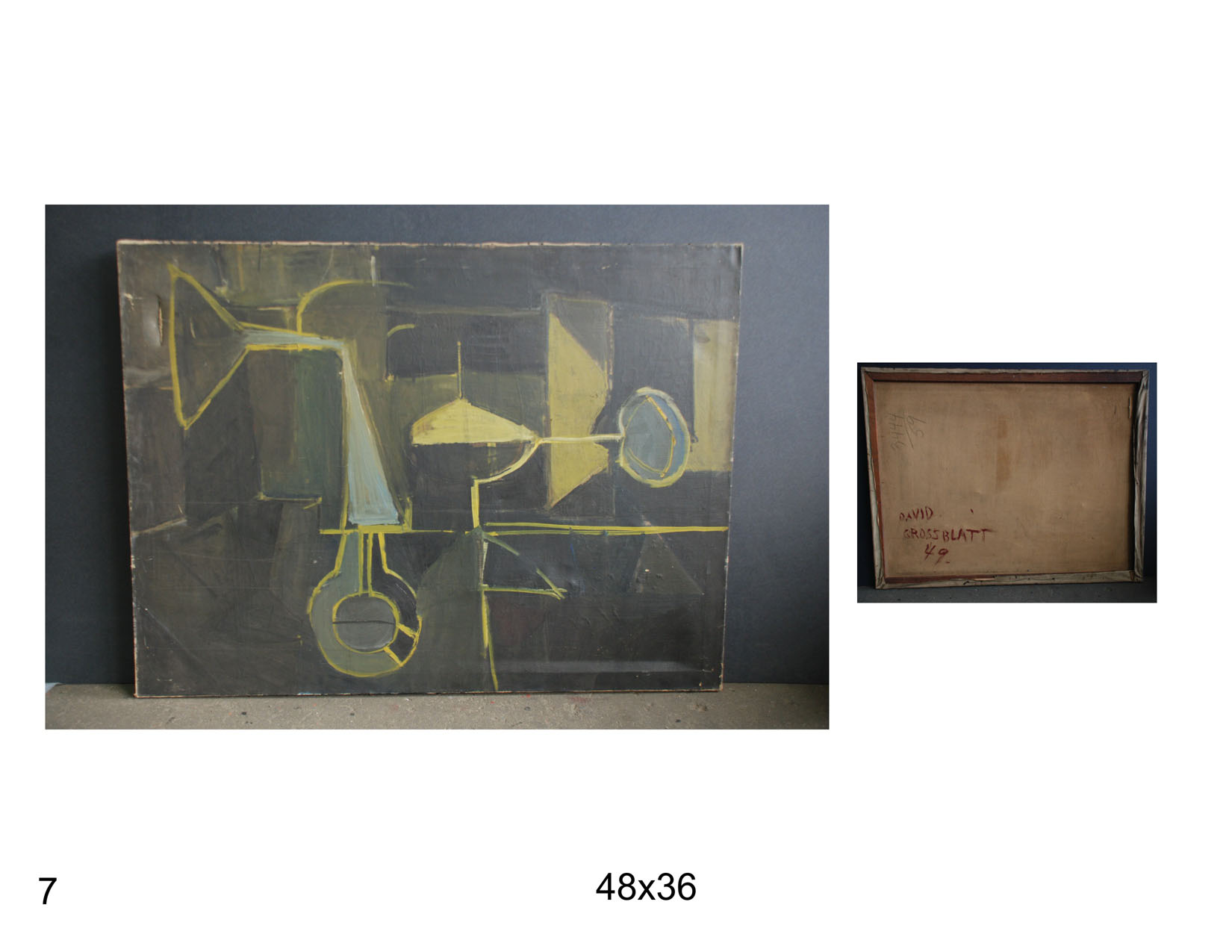
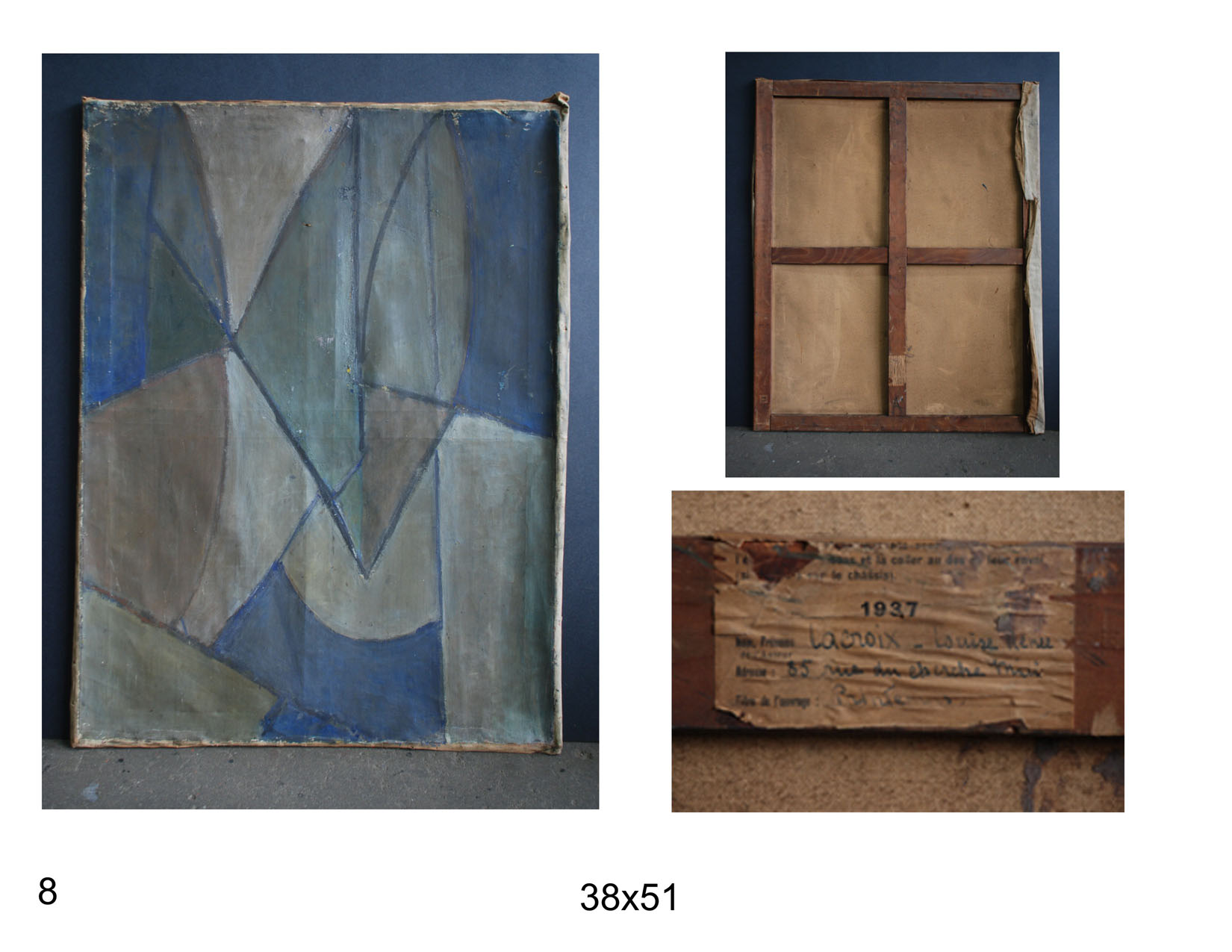
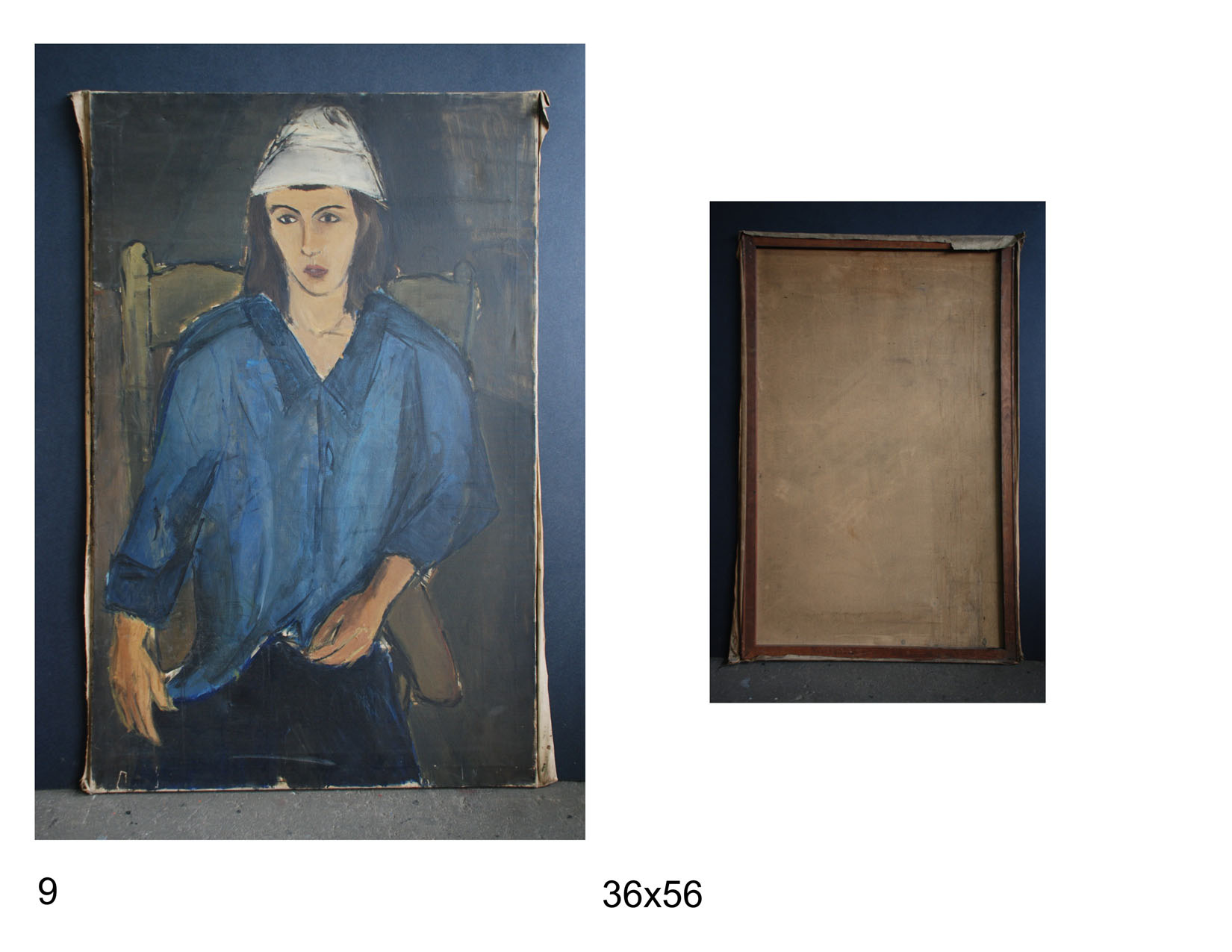
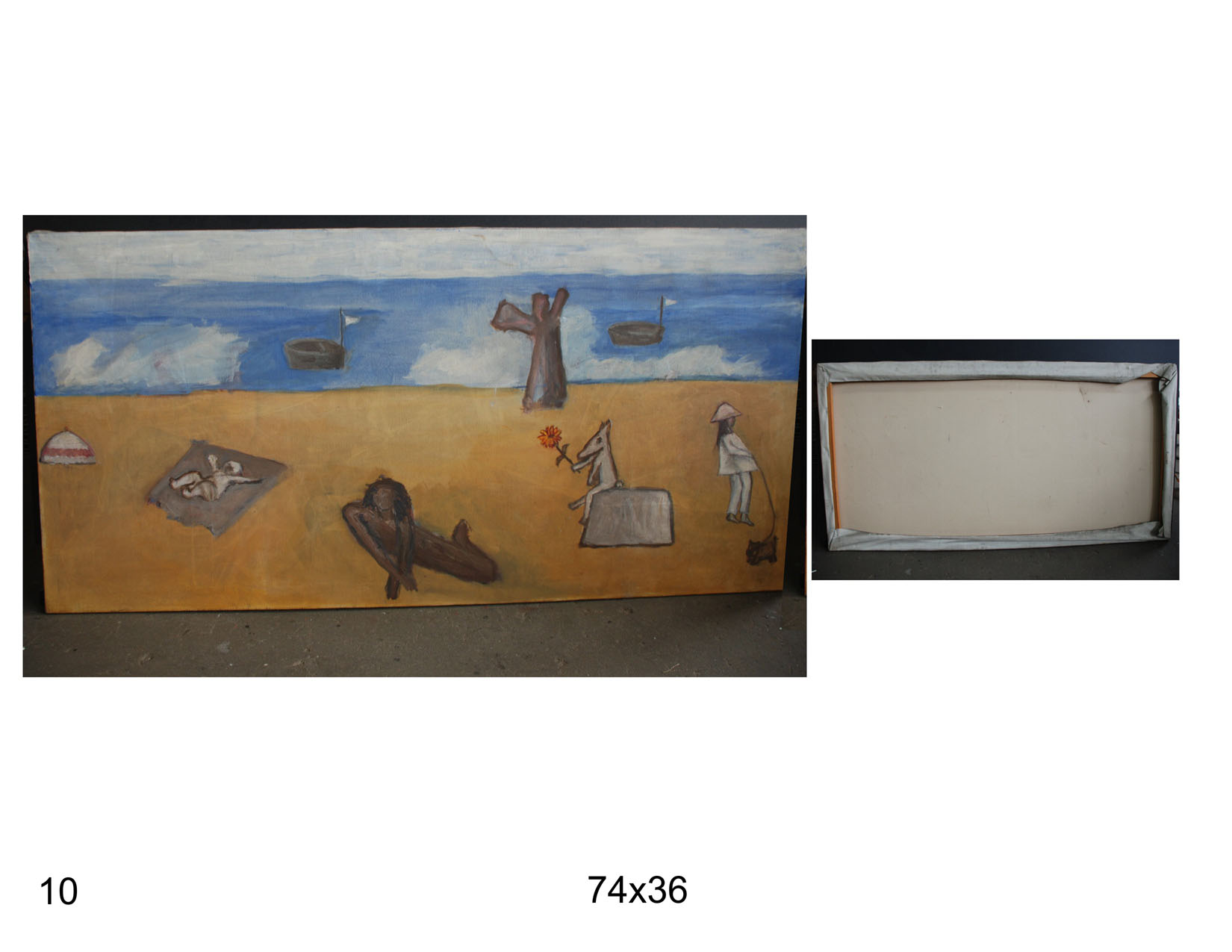
More tidbits from my conversation with Aunt Joan and Uncle Tom:
 A sixties child, an idealist, and a survivor / refugee from the 20th Century! (although sometimes I really miss the 20th Century. ;) )
A sixties child, an idealist, and a survivor / refugee from the 20th Century! (although sometimes I really miss the 20th Century. ;) )
Wednesday, July 04, 2007
More Memories of the Cafe Rienzi
A bunch of my high school friends and I would take the Long Island Rail Road into New York, and head for the Paperbook Gallery. After buying our books, we would then go the the Cafe Rienzi. Here I would order a himbeersaft and hope that people would think I was a real beatnik, instead of a high school kid from the suburbs.
Thanks for the trip down memory lane, Doug! I was no where near New York and the Rienzi during my high school years, unfortunately. That was in the sixties. Makes me feel like I missed out. I just remember the stories my aunt told of the original founders starting it up and the hi-jinx and fights - arguing violently about how to cut the cake and what size to serve and throwing plates at each other across the kitchen. I think that last part was primarily my aunt and uncle's doing, lol!
My parents divorced when I was 13 or 12 and living in South America. But in my childhood, we used to be in and out of New York all the time visiting my grandparents and aunt. I loved to spend the night with Aunt Joan - she was so much fun. She'd take me to Charlie Chaplin movies in the Village and to coffee houses to get that real Italian lemon ice. I knew about real lemon ice and cappucino long before they found their way into the midwest mainstream - and it's still hard to find a really good one (of either) here in the midwest, altho occasionally I get lucky. Uncle Tom took me to his painting studio and let me paint.
Sometimes the family would eat out in the Village too - I remember this one place that had a garden area in back where you could eat outside - I think my Mom and Dad, and Aunt Joan and Uncle Tom, and I were all there for a Sunday meal. I was really little and I tried to catch the pidgeons ...
JuneBug
 A sixties child, an idealist, and a survivor / refugee from the 20th Century! (although sometimes I really miss the 20th Century. ;) )
A sixties child, an idealist, and a survivor / refugee from the 20th Century! (although sometimes I really miss the 20th Century. ;) )
larry's Memories of the Rienzi
"I was about 12 when harry left the biz.....my brother david did work at the rienzi on sunday afternoons for a while . I recall harry having only one partner named david....last name unknown. I could draw a floor plan from memory. I recall the display of fancy Italian pastries.....flimsy wire backed chairs and tables....real la bohme territory....big brass colored expresso machines...a dinky kitchen facility. While in law school in 1979 a friend of mine arranged a double date.....and in the middle dinner it flashed on me ......this resturaunt is the old rienzi, a proustian moment.
as to memories....my parents . quite provincial, seemed facinated by the bohemian types.....and as a child it was clear that my parents thought the patrons a bit exotic/dangerous.
harry liked the beats .....and got out of the biz when the beats morphhed into hippies.....who he did not like. My cousin nina had a birthday party in the back area .....complete with a then exotic pinata.
Before passin I would ask harry about the various iconic peoples passin through in rienzis heyday.
he would repond with statments like.....Kerouac, a fucking drunk............ect.
regret not being more concrete .....i was very young."
Thanks, larry!
Junebug
 A sixties child, an idealist, and a survivor / refugee from the 20th Century! (although sometimes I really miss the 20th Century. ;) )
A sixties child, an idealist, and a survivor / refugee from the 20th Century! (although sometimes I really miss the 20th Century. ;) )
Thanks to Harry Justman's nephew ...
"my uncle harry justman was one of the original owners......he sold his intrest in the mid 60's. my parents spent time there occasionally on sunday afternoons with my brother ands and me. my mom was harry,s only sibling.Harry died approximatley 4 years ago and is survived by his sister, two daughters,and four grandchildren."
Thanks, larry! Do you have any personal memories of the Rienzi? I was pretty young when my aunt and uncle got out of the scene. I have personal memories of Greenwich Village coffee houses, but they're pretty vague.
JuneBug
 A sixties child, an idealist, and a survivor / refugee from the 20th Century! (although sometimes I really miss the 20th Century. ;) )
A sixties child, an idealist, and a survivor / refugee from the 20th Century! (although sometimes I really miss the 20th Century. ;) )
Beginnings of the Cafe Rienzi ...
Okay, I finally have time to sit down and type out a few notes from my last telephone conversation with my aunt about the Cafe Rienzi. It was started by a group of seven friends who were writers and painters in Greenwich Village:
- Tom and Joan Durant - Joan was a pianist and a writer, and Tom was a painter and philosopher.
- Eva (an Austrian immigrant) and Gert (a German immigrant) Berliner* - Gert was a painter. I'm not sure what Eva's art passion was at that time. Gert and Eva eventually separated and Eva is now a retired professor at an exclusive college in New York City.
- Amy Nakamura* (from Japan) - I believe Amy was an artist.
- David Grossblatt - a painter
- Harry Justman and Gloria Siegal
The Cafe Rienzi opened in June 1952 at 113 MacDougal Street. It was the first popular Coffee House in the Village. It had 25 to 30 tables - and seated 150 to 200 people. It had a back room and a front room. There were other Cafes in the Village at that time - small Italian Cafes, that only Italians went to - and a ritzy Cafe named The Peacock.
From the stories I heard growing up, it was a successful albeit tempestuous start. The original group of friends left one by one. Uncle Tom left after the first few months - actually I recall Aunt Joan told me once that the group (including her) kicked him out - I need to get the rest of that story.
Gert, Eva's husband, was the next to leave, and then Aunt Joan left in November and realized a life dream when she traveled to Europe for the first time. She went over on the Queen Mary.
Eventually Harry and David had the Cafe for ten years.
Almost all the famous writers and painters of the fifties and sixties, the beats and the abstract expressionists, frequented the Cafe - and my Aunt and Uncle had opportunity to meet them before they really became famous. Poets - Allen Ginsberg, Jack Kerouac, and Peter Allosci. Artists and sculptors - Mary Frank and Robert Frank, Franz Klein, Jackson Pollock, DeKooning, Bob DeNiro (the actor's father), and Paul Resika, who painted Aunt Joan's portrait and who lived downstairs from Edward Hopper. Writers like Larry Rubin, Richard Wright, and James Baldwin.
Aunt Joan recalled that they used to have loft parties and that she and Bob DeNiro used to love to dance together to Billie Holiday's music. Aunt Joan was also a counselor and teacher's aid at the Greenwich House for the son - Bob DeNiro the actor when he was a boy.
Well, other duties call, and that's about all I have for now. I'm hoping that Aunt Joan and Eva will be supplying me with more stories as time passes by. Aunt Joan wrote a couple of plays based on the Cafe Rienzi that were performed on Off Broadway.
JuneBug
*Thanks to Artemesia for the corrections on the names!
 A sixties child, an idealist, and a survivor / refugee from the 20th Century! (although sometimes I really miss the 20th Century. ;) )
A sixties child, an idealist, and a survivor / refugee from the 20th Century! (although sometimes I really miss the 20th Century. ;) )
Memories of the Cafe Rienzi
There are 11,000 hits when you "google" the internet for information of the Cafe Rienzi on MacDougal Street in Greenwich Village, New York. It is mentioned in reminiscences and memoires of famous authors and poets and artists and musicians and even in the speech of a Nobel prize winner (The Dream Machine-Nobel Speech mentions the Rienzi). James Baldwin, Jack Kerouac, Bob Dylan and many, many more well known names crop up in connection with this cafe - as well as memories of many ordinary people who visted it and frequented it. It was a apparently a Mecca for these types of people in the 50's and 60's much like Paris was a Mecca for artists in decades and centuries preceeding.
What seems little known about the Cafe Rienzi is its beginnings - its roots. My aunt and uncle were two of the original group of friends who launched the Cafe Rienzi in the early 50's. I grew up hearing all those stories - the good times, the fights, and how one by one the original group sold their share and left. My aunt said she received $2000 for her share and spent two months or two years in Europe in grand style in London and Paris and Italy. She went over on the Queen Mary.
By now my aunt and uncle and the other folks who started the Cafe Rienze are quite elderly - in their 80's. But here I hope to start a thread of their memories of this historic and influential Cafe and piece of 20th Century American history. I have asked my aunt to write some of her memories about it, and she in turn has asked her friend Eva, and we will see if those are forthcoming - but for now, my feeble notes will have to do.
More to come as I get the time! My Aunt Joan and Uncle Tom Durant, two of the founders of the Cafe Rienzi, are pictured below.
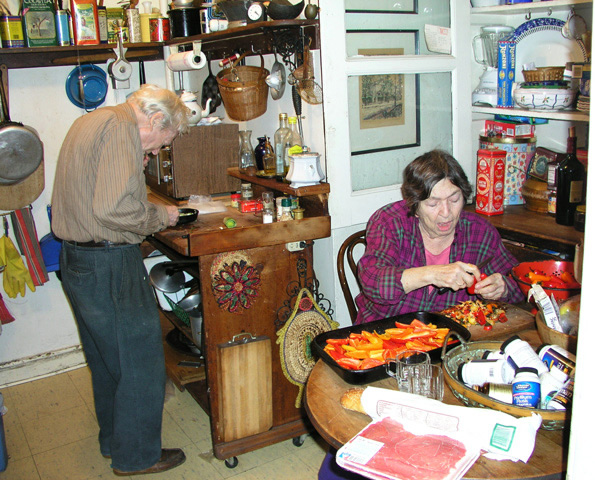
JuneBug
 A sixties child, an idealist, and a survivor / refugee from the 20th Century! (although sometimes I really miss the 20th Century. ;) )
A sixties child, an idealist, and a survivor / refugee from the 20th Century! (although sometimes I really miss the 20th Century. ;) )
